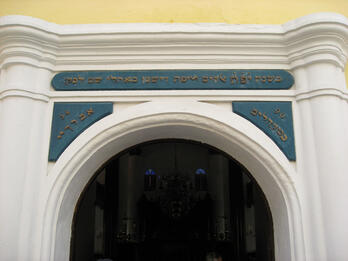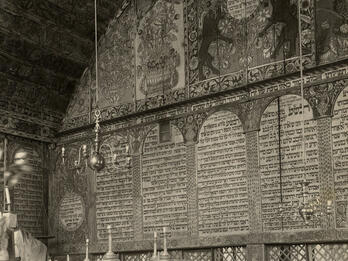Acordos (Regulations)
Sensitive Content
There may not be in this [city of] Recife and Antonio Vaz any congregation beyond that which exists today—may God enlarge it—and, if there be now or at any time anyone who contests this matter, the person who does not comply and obey will be reprimanded by the members of the mahamad [congregation board] and punished with all vigor, besides being condemned for disturbing the peace and the general welfare, and the same sentence shall be meted out to all those who shall come together for the same purpose. It is granted that, in Antonio Vaz, only elderly persons and youngsters—because they cannot come to Recife without great hardship—may congregate in accordance with the declaration that is to be found in our articles of association, to wit the proviso regarding [congregation] Kahal Kodesh Tsur Israel.
All residents belonging to our nation who presently dwell in this [city of] Recife and those who come here from all over Brazil must be yahidim [full members of the community] of this congregation and abide by the rules and regulations recorded in a book in which both present and future members affix their signatures and they shall be subject to general debits and assessments imposed for the benefit of our nation—as do the other yahidim of this congregation—even if they reside in Paraiba or anywhere else. [ . . . ]
Persons who embark for Holland or other parts of the world shall be obligated to pay an amount determined by the members of the mahamad for the ongoing operations of this congregation and shall not be allowed to embark without first settling accounts regarding the aforesaid assessment. [ . . . ]
No one may congregate in public or in secret to vote on opinions, either by written ballot or not, in order to oppose whatever the members of the mahamad have enjoined, nor can anyone claim to be acting for the good of the congregation by obstructing the orders of the members of the mahamad, and anyone so bold as to oppose their rulings shall pay a fine of two hundred fifty florins. And if, after being admonished, the said individual continues to be in contempt [of the mahamad], we shall immediately consider him set apart from our nation, nor shall such a person be readmitted without first paying the aforesaid fine and doing penance. The members of the mahamad shall issue the same order and impose the same fine on anyone who produces defamatory papers or satirical pieces or writes defamatory letters against any person either here in Recife or sends them to Holland and other parts, and the person [committing the said offense] shall undergo the penance ordered by the members of the mahamad.
No one may take anyone else’s letters coming from Holland or other parts and keep them under pain of beraha [i.e., curse] unless it be done out of the goodness of one’s heart with the intention of handing them over to their rightful owners and if it was considered that on Shabbat one does not take letters to the post office or anywhere else because it is contrary to the observance of our sacred Law. [ . . . ]
The members of the mahamad shall be obligated to meet twice a week to deal with general needs and lend assistance for the common good, so that there be no person enduring poor living conditions or any other suspected evils that must be corrected in the best manner possible without public scandal, and should this not be turned to good account, the members of the mahamad will mete out a suitable penalty to anyone disobeying the mahamad in these matters and whatever is imposed upon him will be carried out, for it is understood that such enforcement is permissible so that there be no iniquity in the community.
Should any offensive incident happen to a person whereby he falls into the hands of the magistrates, they shall immediately affirm to him that they do not favor him by word or deed, for his case does not warrant it nor does our reputation. [ . . . ]
And because any type of dispute against other religions is to our detriment and misfortune, it is hereby ordered that no person may engage in this activity and whoever finds himself committing such an error shall be penalized by the members of the mahamad in a manner they deem appropriate. [ . . . ]
No person may circumcise an outsider nor permit a foreign woman to be ritually immersed [to undergo conversion] under pain of being ostracized from the nation and being fined fifty florins unless it be done with the consent of the members of the mahamad. In the case of a slave, he may not be circumcised without first being set free by his master, so that he be unable to sell someone whose end of servitude he has endorsed.
Credits
The Jewish Community of Recife, “Acordos (Regulations)” (manuscript, Recife, 1648). Republished as: “Kahal kadosh zur Israel (Recife, Brazil),” in O Livro de atas das Congregações Judaicas zur Israel em Recife e Magen Abraham em Mauricia, Brasil: 1648–1653, ed. Arnold Wiznitzer (Rio de Janeiro: Biblioteca Nacional, Divisão de Obras Raras e Publicações, Ministério da Educação e Cultura, 1955), pp. 13–16 (nos. 9–12, 19, 25, 32).
Published in: The Posen Library of Jewish Culture and Civilization, vol. 5.




